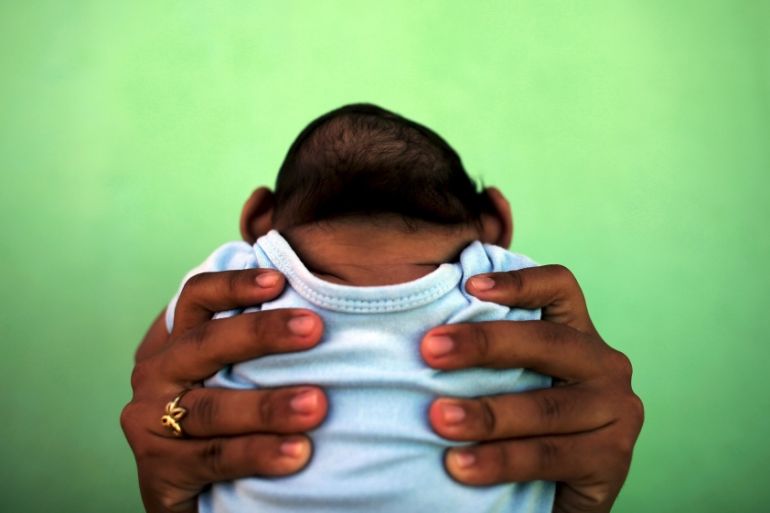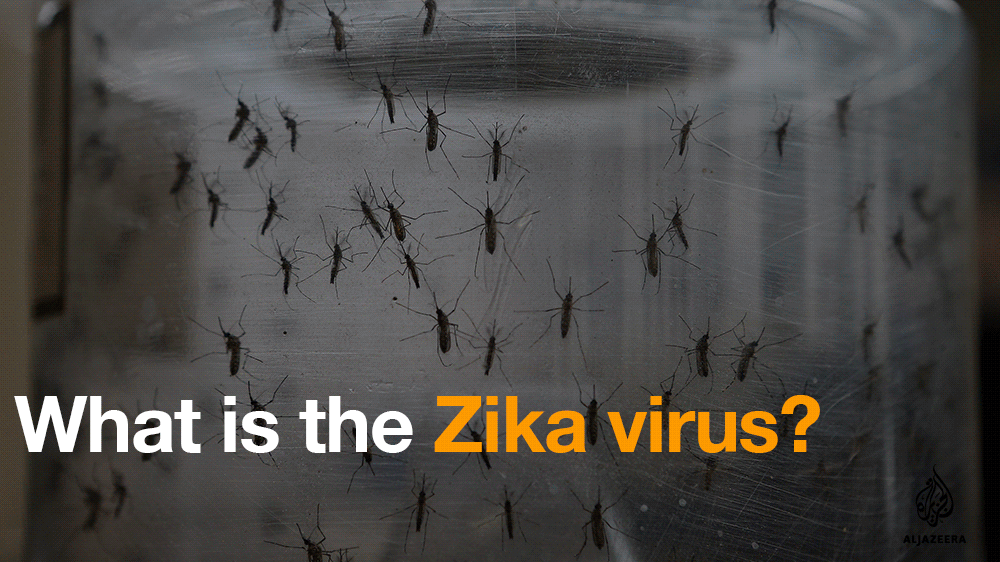Living with Zika in Brazil
Microcephaly epidemic highlights the inequality experienced by low income communities and women.

Pernambuco State, Brazil – At around 1:30am on a Saturday morning, 26-year-old Jaqueline Vieira de Souza bundled her four-month-old son, Daniel, into the car. They drove from her working-class neighbourhood on the outskirts of the city of Olinda to the National Institute of Social Security (INSS) office in Recife, roughly 40 minutes away at that time of the morning.
The office was opening specifically to process disability pension applications for babies, like Daniel, who have microcephaly.
Keep reading
list of 4 itemsCould a bird flu pandemic spread to humans?
Family says al-Shifa doctor was tortured to death in Israeli prison
Measles outbreak kills at least 42 people in northeast Nigeria
Ten hours later, Vieira de Souza was exhausted. “I need to put my head down. I went to bed around midnight and managed to sleep about half an hour,” she said.
![Jaqueline Vieira de Souza with her son, Daniel [Zoe Sullivan/Al Jazeera]](/wp-content/uploads/2016/03/0cd4d17df7154f2384e48df5994622f3_18.jpeg)
The area around Recife, the capital of Pernambuco State, has been the epicentre of the microcephaly epidemic. It seems linked to the Zika virus, but this has not yet been confirmed.
As of April 2, Brazil’s Ministry of Health has reported 6,906 suspected cases of microcephaly since 2015. Of these nearly 27 percent came from Pernambuco, which is located in the impoverished northeastern region of Brazil that accounts for nearly 80 percent of the country’s microcephaly cases.
Zika and microcephaly have grabbed international headlines, but they are also highlighting some of the faultlines in Brazilian society around gender, race and class.
Some of the biggest issues underlying the epidemic reflect the inequality within the country.
Continuous struggle
“You don’t know what the limitations are going to be, and that really makes you anxious,” Vieira de Souza said, remembering when, during her pregnancy, she learned that Daniel wasn’t developing normally.
A two-time cancer survivor and a single mother of two, Vieira de Souza is no stranger to challenges.
In November, she registered with the INSS for an appointment for Daniel. Four months later, thanks to this day focused on mothers with microcephalic babies, the paperwork is done.
But the long wait for the appointment and the pressure needed to convince the government to open its offices, illustrate some of the day-to-day struggles facing women in a region coping with dengue, chikungunya, and Zika.
For about a month, Vieira de Souza has been participating in a support group through AMAR, the Alliance for Rare Mothers and Families. The group helps mothers of children with rare diseases and special needs, but it also presses for policy changes. It was the group’s open letter that helped convince the INSS to open offices across northern Brazil on Saturday.
Along with the Recife INSS office, those in Fortaleza, Salvador and Sao Luis de Maranhao opened as well.
In 30 days Vieira de Souza will learn whether her son will receive a pension of 880 reals (roughly $250) that the government provides to people with disabilities.
“It’s resolved, but it’s not going to come through because of my income. I receive an illness pension because I had cancer and support my [older] son. When the paper comes, I’ll go to court. It’s [Daniel’s] right,” she said.
Since separating from her partner, Vieira de Souza has spent all of her income on rent. She has fed her children thanks to donations, including some from AMAR.
According to Silvia Camurca, a community educator with the women’s rights organisation SOS Corpo, this situation is typical of what happens with many low-income women when faced with a family health crisis.
“In Brazil, the majority of the people who work for themselves with no social protection are women. If you’ve got Zika, and you don’t work for three days, you won’t have the money to buy groceries at the end of the week,” Camurca said.
Although the Pernambuco State Health Department said no analysis had been done to determine the demographics of those with Zika, Dr Adriana Scavuzzi of Recife’s pediatric teaching hospital, IMIP, said that almost 99 percent of the microcephaly cases come from people who use Brazil’s public health system.
This suggests that they are low-income and lack the money to pay for a private health insurance plan.
Systemic failures?
While financial issues pose one obstacle for mothers like Vieira de Souza, abandonment presents another. Roughly 40 percent of AMAR’s 400 members, some 69 of whom have babies with microcephaly, have been abandoned by their partners, says Debora Rorato, vice president of the organisation.
Rorato argues that the microcephaly phenomenon has simply exposed existing failures in Brazil’s system for dealing with disabilities and rare diseases.
“[Mothers] don’t have a creche. This is a right that the government has denied. And when we talk about disabled children, there’s a whole generation here. Where are the special schools? Where are the therapy centres? They don’t exist,” Rorato said.
![Debora Rorato of AMAR says many mothers of babies with microcephaly have been abandoned by their partners [Zoe Sullivan/Al Jazeera]](/wp-content/uploads/2016/03/0457c059cff5404d969a759b7b380bc3_18.jpeg)
Gender bias
For Andreia Vieira da Silva, a community representative for Coelhos, one of Recife’s poorest neighborhoods, the reason behind these shortcomings may lie in gender bias. “The government is very machista. Even if Brazil has a woman president.”
For Vieira da Silva this machismo plays out in lack of access to reproductive health education.
“It’s not clear yet if microcephaly is linked to mosquitoes or not, but even so, I don’t see a massive effort to educate people here in the community [about reproductive health],” Vieira da Silva said.
In early March, Amnesty International charged Latin American countries with endangering women’s lives with their reproductive health policies. Their report argues that policy decisions prioritise religious doctrine and stereotypes instead of women and girls’ real needs.
In Brazil, abortion is illegal except in cases of rape or risk to the mother’s life.
“If my life had been at risk, if it had been an issue of death, I would have wanted to [terminate],” Vieira de Souza told Al Jazeera, stressing that she was happy that her son came to term.
Many women’s advocates support legalising abortion to allow women to choose whether they wish to keep or terminate the pregnancy.
But, said Camurca: “We can’t take on the issue of abortion just to avoid a generation of disabled people.”
Camurca believes that society needs to include the full range of able and disabled people.
“If there are people who can’t be productive for companies, they also need to be included, and they can contribute with other kinds of meaning in life.”
Read more: Zika virus facts you need to know
